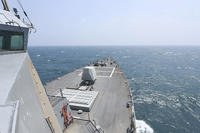Defense Secretary-nominee Panetta breezed through his Senate confirmation hearing on Thursday, making almost no new statements or commitments and keeping ample room to decide and maneuver when he takes over for Robert Gates. Panetta, who called himself "a creature of Congress," knows just how to handle the legislative branch, and he had the members of the Senate Armed Services Committee purring like kittens over the course of his nearly four-hour appearance.
Panetta vowed to look at improving DoD's acquisition process -- but didn't say how, or what specifically he thought was wrong with it. He agreed to "take a close look" or "learn more about" members' pet issues, from the F-35 to alternative fuel, and, most crucially, he promised to "work with you" -- Congress -- as he goes about his job. Although the Armed Services Committees regularly praise Gates, members in both chambers have grumbled that the Pentagon freezes them out on important decisions, and so they love being told they'll be kept in the loop by someone they know understands the Hill ways.
Although Panetta told the SASC he thought Washington wouldn't have to choose between fiscal discipline and a strong defense -- he says it can have both -- he also said he wanted to wait until the results of the Mother of All Reviews before he knows what to cut. He said he agrees with Gates that Congress shouldn't just pick a percentage and then cut the Pentagon's budget by that amount, that strategy should come first. But he also says "everything is on the table," when considering cuts, and he did not lay down a list of programs to be held harmless, as Gates has.
Panetta wants to wait for ISAF commander Gen. David Petraeus to make recommendations on next month's troop pullout in Afghanistan, and he would not give any opinion about how he believes it should go. He said the U.S. should seriously consider it if Iraq asks for American forces to stay beyond the end of this year. He said he thinks cyber-warfare will be an important area of focus for DoD and the rest of the national security apparatus.
In other words, Panetta said almost nothing new -- he deftly kept inside lines that Gates has drawn, or remained affably non-committal. Panetta did make a vague statement about seeing whether it's possible to move up the time by which DoD needs to be able to pass a complete audit, and he hinted that Somalia's al Shabab terror group could be plotting attacks outside Somalia. Mostly, though, Panetta wants no strings tying him down as he moves into the Pentagon and begins to work its levers for himself.
One of his greatest advantages will be the amount of goodwill he clearly enjoys with Congress. It was striking to recall Gates' confirmation hearing in 2006, held in the shadow of Rumsfeld, and compare it to Thursday's genial session. Even when senators did ask Panetta tough questions, ones for which he didn't have answers, there was always a convivial air; you almost got the sense he and the senators were winking at each other.
Missouri Democratic Sen. Claire McCaskill told Panetta that the U.S. has probably wasted billions of dollars, if not more, on development projects in Afghanistan. She told a story about an American-funded power station in Kabul that cost $300 million, but which now sits idle as the Afghans buy electricity from elsewhere because they say they can't afford fuel. Maine Republican Sen. Susan Collins pointed out that the U.S. will spend around $12 billion this year on the Afghan National Army, but that Afghanistan's entire gross domestic product is only around $30 billion -- and much of that is in the form of international aid. If America's long-term strategy is to withdraw and have the Afghans take over their own security, how is Afghanistan going to afford it?
Panetta didn't have an answer for either question -- he told the senators he shared their concerns, and that Afghanistan was clearly a challenging case. Here was his exact response to McCaskill: "That’s going to be part of the governance challenge they face there, to be sure that, as a nation, they develop resources and revenues they need to be a country. That’s got to be part of it. Otherwise it’s not going to work.” In other words: Yep, senator, you're right. He told Collins something very similar: Yeah, it's a bad situation.
From the Obama administration's perspective, it's a success: If Panetta is going to the Pentagon as a "hatchet man," charged with making the first big cuts in a decade, now he's got plenty of room to swing his ax.







